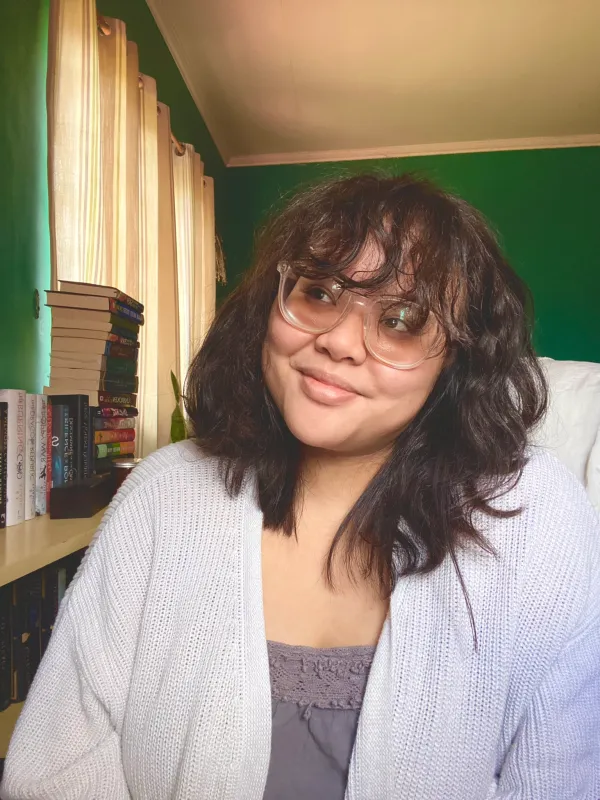Book Bloggers: Your Tita Kate Profile

About Kate: Kate is a writer, sensitivity and beta reader, and the blogger behind Your Tita Kate. On her blog she likes to recommend diverse reads, discuss representation and advocacy, and promote Filipino authors. She describes her blog as a space to discuss not just what makes a book good, bad, or something in between, but also issues like the importance of diversity and representation, accessibility, human rights and politics, and the extra challenges faced by international readers from third world countries. You can find Kate on her blog, Twitter, and Instagram.
This interview has been edited and condensed.
Jenna: What got you interested in book blogging and why do you keep doing it?
Kate: I've kept blogs since I was 12 years old, moving from platform to platform. I started out on Livejournal in the 2000s, then Tumblr in the 2010s. What stayed consistent throughout all that movement was the topic of said blogs: books. Sometimes, it was just one particular book—I remember I had a Tumblr dedicated to The Hunger Games and Vampire Academy from 2008–2010. But books were my constant. Eventually, it got to a point where I realized that I wanted to grow an audience and position myself as someone with important and valuable information to share. I started a WordPress blog with the aim of growing my following in 2018, and eventually moved to self-hosting so I could own my own website. My goal has always been to share my love for books with the world—that's really what keeps me going.
Jenna: Book blogging—especially in its traditional form of written blog posts—is almost always a labor of love, and it can take years of work to build up followers and engagement. While BookTok and in general bookish creators have seen more mainstream attention recently, my former point stands. What keeps you blogging, and do you have any hopes about how blogging could look in the future?
Kate: As I got older, I began to realize that the books I read never, ever featured people like me. For that matter, whenever I read fanfiction (because of course, lol) of the books I loved, it was almost always considered a bad thing if you wrote an OC that had the same ethnicity as yourself. The advent of diversity in literature in the late 2010s finally put words to what I was looking for, which I could never really describe when I was a young teen reader: the desire for representation. To this day, this desire is my reason for blogging.
BIPOC-authored books, especially those written by authors from the global south, now exist. But they are still massively at a disadvantage in an industry where the majority of players - agents, editors, publicists, marketers, and so much more - are white. I keep blogging not only because I love these BIPOC-authored works, but also because I want to use my platform to promote and boost these works. Sometimes I feel like my efforts are just a drop in the ocean. But the desire for the industry as a whole to be better, and for future readers to have even more options than I did, keeps me going!
To be honest with you, I don't really have any idea what book blogging would look like in the future! Certainly one way that book bloggers have really changed is that most of us have pivoted to be able to use social media as well as our blogs. Plenty of book bloggers are also on Twitter, Instagram, and Tiktok. Not only do they use these platforms to create short-form content, they also use them to boost their own blog posts. For me, Twitter and Instagram remain amongst the top 5 referrers to my blog!
Jenna: Following on from my last question; we often talk about the importance of word-of-mouth in the literary world. Publishers can do endless amounts of publicity, but one of the most effective ways of getting someone to read a book has always been someone whose opinions you trust recommending you a book. Booksellers and Librarians are who the typical person might think of, but bookish creators also take on this role. What impact do you think book bloggers have specifically, and how might it look different?
Kate: Personally, I think book bloggers' impact really lies in longform reviews and bookish discussions. Deep-diving into anything, whether it's a book or the latest issue or discourse to hit bookish social media, deserves to be treated with care and thoughtfulness. Which isn't to say that I don't think social media can accomplish that! There are plenty of bookish creators on other platforms that are able to get their thoughts across in a clear and concise way.
But let's face it—nuance and critical thinking is challenging to accomplish in a post that's only 240 characters or 30 seconds to 1 minute long. In my own opinion, book blogs can accomplish this, not to mention they have longevity that social media doesn't. A post that was written a year ago, as long as its author makes sure it's updated to reflect new information, will still be relevant, will still rank, and will still show up on search engines. That kind of longevity is important to all industries but especially to the book industry, and especially to midlist and backlist books!
Jenna: I often think about how book blogging connects to the broader literary world. You offer on your blog some paid services like sensitivity reading and beta reading, which expands your blog beyond what the average perception might be of what a book blogger can offer. How do you think work like that and blogging fits into the broader literary world?
Kate: Personally I feel like my work as a book blogger and my work as a sensitivity and/or beta reader helps each other! I feel like I'm better at assessing books and looking at them from critical viewpoints because I'm constantly working to improve myself as a sensitivity and/or beta reader so I can continue giving helpful, thoughtful feedback to authors. On the other hand, I also feel like an essential part of being a good sensitivity and/or beta reader is continuing to read widely—a wide variety of genres, age ranges, and authors from different marginalized communities other than my own. So that then translates to more and varied content for my blog!
As I mentioned above, book bloggers can offer deep-dive and long-form content that can stay relevant and searchable for many, many years. This in my opinion is an invaluable marketing tool. Meanwhile, sensitivity and/or beta readers play an important role in making sure that authors' books are a good reading experience, whether that experience involves accuracy, flow of the written word, or thoughtful and discerning handling of difficult issues.
Jenna: It feels remiss not to ask you, so, can you tell me your favorite book you love to recommend? And are there any fellow book bloggers whose work you love that we shouldn’t be missing out on?
Kate: I have way too many favorite books to recommend, but I'm currently reading Marikit and the Ocean of Stars by Caris A. Cruz which comes out in October, and a constant favorite is The Wolf of Oren-Yaro by K.S. Villoso! Off the top of my head, some other book bloggers I can't recommend enough: Lia, Sumedha, Fadwa, Kal, Lay, Inah, and Gauri. There's a lot more out there though! So, so, so much more!
